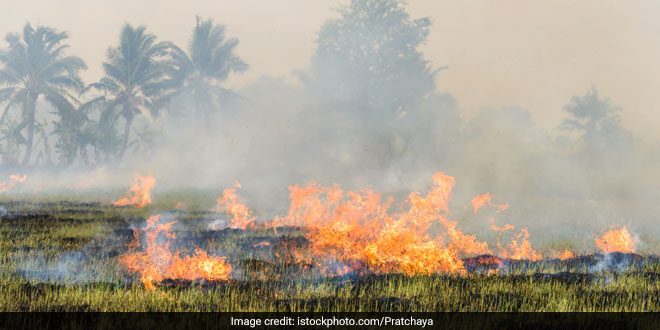New Delhi: The National Green Tribunal has directed the Ministry of Agriculture and the Punjab, Haryana, Uttar Pradesh and Delhi chief secretaries to periodically review steps taken to stop crop burning incidents. A bench headed by NGT Chairperson Justice Adarsh Kumar Goel said there was a need to adopt a multi-method approach through in situ and ex situ management of crop residue to minimise stubble burning incidents. The green panel directed the states to compile data on instances of stubble burning “appropriately through revenue records” and asked the Centre to “disburse funds well in time” so that they can be utilised by the states. It directed the Ministry of Agriculture to furnish a status report to the tribunal on or before April 30, 2019, and said it would consider it on May 9.
The tribunal was also informed that the Centre has released Rs. 577.11 crore under the Crop Residue Management Scheme, out of which Rs. 328.01 crore has been spent on procurement of machinery due to which crop burning incidents have reduced to 12.39 per cent.
Fire incidents have mainly taken place from 1st November to 12th November. The statistics show that in the State of Punjab fire incidents this year are more than the fire incidents in the last year, during the November 1 to November 12, though, overall number of incidents are less than last year, the bench noted.
The tribunal was informed that the Centre has initiated awareness programmes through “Krishi Vikas Kendras” and the Punjab government has introduced a lesson on stubble burning awareness in the education curriculum.
Youth clubs have also been involved. Rallies of school children have also been promoted by the government of India. In Delhi, farmers have been trained on the subject. In the State of Haryana, similar awareness programmes have been undertaken and farmers have also been trained which has also been done in Uttar Pradesh, the bench noted.
The NGT was also informed that in Haryana, the Haryana Bio Energy Policy, 2018, was notified on March 9 to provide for bio-based power projects. It noted that live demonstrations of in situ crop residue management have been given to villages and crop burning is monitored through satellite.
Monitoring is also done at the chief secretary level regularly through field visits and video conferencing and a state level monitoring committee has been constituted to prevent crop residue burning. A Memorandum of Understanding has been signed between the department of agriculture and the Indian Oil Corporation for use of crop residue for bio-refinery, it noted.
The tribunal had earlier said there was a need to find out a long-lasting solution to the problems of stubble burning and directed the chief secretaries of four states to appear before it to explain ways to prevent it.
Also Read: Stubble Burning Accounted For 3 Per Cent Of Delhi’s Air Pollution: SAFAR
The green panel was hearing the matter after taking note of a news report published in an English daily titled, “All fiddle as crop stubble burns, farmers say solutions out of reach.” The report had claimed that crop burning shoots up the carbon dioxide levels in the air by 70 per cent. It had said every year in October, the air quality in Delhi, Punjab and Haryana plummets as farmers set the leftover stubble and loose straw on fire after paddy is harvested using combines.
It had also claimed that over the last two years, the central and state governments have devised a number of measures to prevent crop burning — from slapping fines on farmers to subsidising equipment that allow seeds of the next wheat crop to be planted with the stubble still on the fields.
The tribunal had earlier directed the Secretary of the Ministry of Agriculture to submit a status report within six weeks on providing infrastructural assistance to farmers to stop them from burning crop residue to prevent air pollution.
NDTV – Dettol Banega Swachh India campaign lends support to the Government of India’s Swachh Bharat Mission (SBM). Helmed by Campaign Ambassador Amitabh Bachchan, the campaign aims to spread awareness about hygiene and sanitation, the importance of building toilets and making India open defecation free (ODF) by October 2019, a target set by Prime Minister Narendra Modi, when he launched Swachh Bharat Abhiyan in 2014. Over the years, the campaign has widened its scope to cover issues like air pollution, waste management, plastic ban, manual scavenging and menstrual hygiene. The campaign has also focused extensively on marine pollution, clean Ganga Project and rejuvenation of Yamuna, two of India’s major river bodies.




























